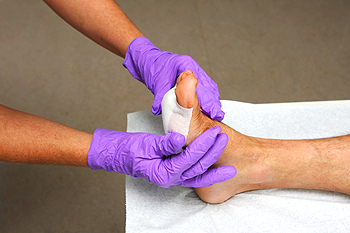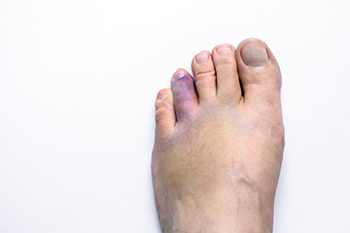
A foot ulcer is an open sore that usually forms on the bottom of the foot, often caused by pressure, friction, or injury. This condition is particularly common in people with diabetes or poor circulation, as high blood sugar and reduced blood flow can slow down the healing process. Foot ulcers can be painful, and if left untreated, they can become infected or worsen over time. Managing a foot ulcer requires careful wound care, including regular cleaning, applying the right dressings, and protecting the area from further injury. It is also important to manage underlying conditions like diabetes by keeping blood sugar levels under control. A podiatrist can help by providing antibiotics if an infection is present, recommending proper footwear, and advising on techniques to offload pressure from the affected area. These steps are key in promoting healing and preventing recurrence. If you have developed a foot ulcer, it is suggested that you make an appointment with a podiatrist for proper care and treatment.
Wound care is an important part in dealing with diabetes. If you have diabetes and a foot wound or would like more information about wound care for diabetics, consult with Peter Siroka, DPM from Connecticut. Our doctor will assess your condition and provide you with quality foot and ankle treatment.
What Is Wound Care?
Wound care is the practice of taking proper care of a wound. This can range from the smallest to the largest of wounds. While everyone can benefit from proper wound care, it is much more important for diabetics. Diabetics often suffer from poor blood circulation which causes wounds to heal much slower than they would in a non-diabetic.
What Is the Importance of Wound Care?
While it may not seem apparent with small ulcers on the foot, for diabetics, any size ulcer can become infected. Diabetics often also suffer from neuropathy, or nerve loss. This means they might not even feel when they have an ulcer on their foot. If the wound becomes severely infected, amputation may be necessary. Therefore, it is of the upmost importance to properly care for any and all foot wounds.
How to Care for Wounds
The best way to care for foot wounds is to prevent them. For diabetics, this means daily inspections of the feet for any signs of abnormalities or ulcers. It is also recommended to see a podiatrist several times a year for a foot inspection. If you do have an ulcer, run the wound under water to clear dirt from the wound; then apply antibiotic ointment to the wound and cover with a bandage. Bandages should be changed daily and keeping pressure off the wound is smart. It is advised to see a podiatrist, who can keep an eye on it.
If you have any questions, please feel free to contact our office located in Stamford, CT . We offer the newest diagnostic and treatment technologies for all your foot care needs.

A bruised toe and a broken toe can cause pain and discomfort, but they have distinct differences. A bruised toe occurs when direct impact or pressure damages the small blood vessels under the skin, leading to discoloration, tenderness, swelling, and mild difficulty in movement. The pain is usually manageable, and mobility is often preserved. A broken toe results from a more severe injury, such as heavy impact or sudden force, causing a fracture in the bone. Symptoms include severe pain, swelling, bruising, difficulty moving the toe, and sometimes a visible deformity. A popping sound may be heard at the time of injury. While bruised toes typically heal with rest, broken toes often require medical evaluation. If you have injured your toe, it is suggested that you contact a podiatrist who can accurately diagnose bruised and broken toes, and offer appropriate treatment solutions.
A broken toe can be very painful and lead to complications if not properly fixed. If you have any concerns about your feet, contact Peter Siroka, DPM from Connecticut. Our doctor will treat your foot and ankle needs.
What to Know About a Broken Toe
Although most people try to avoid foot trauma such as banging, stubbing, or dropping heavy objects on their feet, the unfortunate fact is that it is a common occurrence. Given the fact that toes are positioned in front of the feet, they typically sustain the brunt of such trauma. When trauma occurs to a toe, the result can be a painful break (fracture).
Symptoms of a Broken Toe
- Throbbing pain
- Swelling
- Bruising on the skin and toenail
- The inability to move the toe
- Toe appears crooked or disfigured
- Tingling or numbness in the toe
Generally, it is best to stay off of the injured toe with the affected foot elevated.
Severe toe fractures may be treated with a splint, cast, and in some cases, minor surgery. Due to its position and the pressure it endures with daily activity, future complications can occur if the big toe is not properly treated.
If you have any questions please feel free to contact our office located in Stamford, CT . We offer the newest diagnostic and treatment technologies for all your foot and ankle needs.

Heel pain is a common issue that can be caused by numerous conditions like plantar fasciitis, Achilles tendonitis, or bursitis. Arthritis and gout can also play a role. Plantar fasciitis causes sharp pain in the bottom of the heel, especially with the first steps in the morning. Achilles tendonitis results in pain and swelling in the back of the heel due to overuse or strain on the Achilles tendon. Bursitis involves inflammation of the fluid-filled sacs around the heel, causing pain and swelling. Arthritis and gout can lead to joint pain, swelling, and redness, often in the heel area. The causes of heel pain vary but often involve repetitive stress, poor footwear, obesity, or underlying health conditions like arthritis or gout. The pain can range from mild to severe and can significantly impact mobility. A podiatrist can diagnose the underlying cause of heel pain and recommend treatment, such as targeted exercises, orthotics, medication, or, in severe cases, surgery. If you are dealing with heel pain, it is suggested that you make an appointment with a podiatrist.
Many people suffer from bouts of heel pain. For more information, contact Peter Siroka, DPM of Connecticut. Our doctor can provide the care you need to keep you pain-free and on your feet.
Causes of Heel Pain
Heel pain is often associated with plantar fasciitis. The plantar fascia is a band of tissues that extends along the bottom of the foot. A rip or tear in this ligament can cause inflammation of the tissue.
Achilles tendonitis is another cause of heel pain. Inflammation of the Achilles tendon will cause pain from fractures and muscle tearing. Lack of flexibility is also another symptom.
Heel spurs are another cause of pain. When the tissues of the plantar fascia undergo a great deal of stress, it can lead to ligament separation from the heel bone, causing heel spurs.
Why Might Heel Pain Occur?
- Wearing ill-fitting shoes
- Wearing non-supportive shoes
- Weight change
- Excessive running
Treatments
Heel pain should be treated as soon as possible for immediate results. Keeping your feet in a stress-free environment will help. If you suffer from Achilles tendonitis or plantar fasciitis, applying ice will reduce the swelling. Stretching before an exercise like running will help the muscles. Using all these tips will help make heel pain a condition of the past.
If you have any questions please contact our office located in Stamford, CT . We offer the newest diagnostic and treatment technologies for all your foot and ankle needs.

